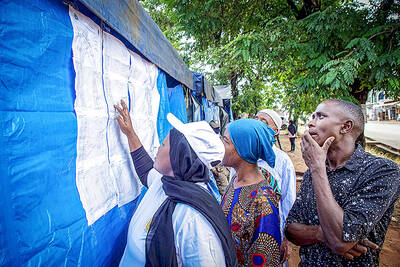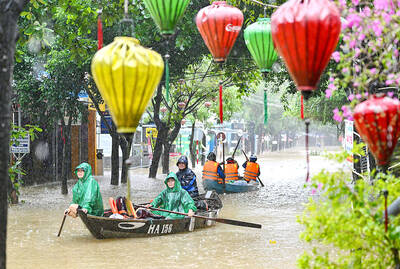California Governor Arnold Schwarzenegger's name will not appear on the special election ballot on Tuesday, when California voters go to the polls to consider initiatives he says are crucial to reshape state government.
But the special election he called is as much a referendum on the governor himself as it is about the "year of reform" agenda he is asking voters to support. Its outcome is likely to set the stage for the next chapter of his unconventional political career.
If Schwarzenegger's early days in office were characterized by his celebrity status and bipartisan governing style, the past year has been defined by his launch of this divisive special election and the fallout from that decision.
A recent poll found that just 36 percent of voters want to see Schwarzenegger re-elected next year, with 55 percent opposed.
Schwarzenegger was elected as a moderate Republican in a Democratic state, but veered to the right to promote his reform initiatives, which target Democratic lawmakers and public-sector unions. He has paid a price for that gamble, losing support from large numbers of Democrats and independents, who constitute more than 60 percent of the California electorate.
Whatever the outcome, political experts said the governor must work to repair the damage to his image brought on by the special election, which will cost the state US$52 million to US$55 million. Whether he can do so will determine his ability to govern next year and the strength of his reelection bid.
"If all the initiatives go down, partisan Democrats will say `We beat him today, now let's go beat him next year," said political analyst Allan Hoffenblum.
But Hoffenblum, who is a former Republican campaign consultant, said Schwarzenegger can reclaim some of his lost stature and position himself for re-election if he absorbs some important lessons.
"He needs to reconnect with soft Democrats and independent voters, keep the rhetoric and jokes down, and come up with some good ideas," Hoffenblum said.
Schwarzenegger already appears anxious to move in that direction, especially as polls show none of his four initiatives with majority support. He wants to reform teacher tenure laws, limit state spending, change the way legislative districts are drawn and reduce the ability of public employee unions to raise money for political campaigns.
Voters also will decide on Tuesday between two competing initiatives aimed at reducing the cost of prescription drugs; a constitutional amendment requiring doctors to notify the parents or guardians of underage girls seeking abortions; and an initiative on whether to reregulate the state's electric utilities.
In recent days, Schwarzenegger has talked about plans to tackle several of the state's major problems next year, including traffic congestion, children without health insurance and underperforming schools -- the kind of issues critics complain his ballot measures did little to address.
In an interview last week, Schwarzenegger said he planned to work closely with legislative leaders despite their differences over the special election.
"No matter what the outcome of the election, we have to talk," Schwarzenegger said. "This place is ready to boom. It could be another Gold Rush here. So let's start putting a program together for infrastructure that's really big thinking -- like landing a man on the moon kind of vision. Big."

With much pomp and circumstance, Cairo is today to inaugurate the long-awaited Grand Egyptian Museum (GEM), widely presented as the crowning jewel on authorities’ efforts to overhaul the country’s vital tourism industry. With a panoramic view of the Giza pyramids plateau, the museum houses thousands of artifacts spanning more than 5,000 years of Egyptian antiquity at a whopping cost of more than US$1 billion. More than two decades in the making, the ultra-modern museum anticipates 5 million visitors annually, with never-before-seen relics on display. In the run-up to the grand opening, Egyptian media and official statements have hailed the “historic moment,” describing the

‘CHILD PORNOGRAPHY’: The doll on Shein’s Web site measure about 80cm in height, and it was holding a teddy bear in a photo published by a daily newspaper France’s anti-fraud unit on Saturday said it had reported Asian e-commerce giant Shein (希音) for selling what it described as “sex dolls with a childlike appearance.” The French Directorate General for Competition, Consumer Affairs and Fraud Control (DGCCRF) said in a statement that the “description and categorization” of the items on Shein’s Web site “make it difficult to doubt the child pornography nature of the content.” Shortly after the statement, Shein announced that the dolls in question had been withdrawn from its platform and that it had launched an internal inquiry. On its Web site, Le Parisien daily published a

UNCERTAIN TOLLS: Images on social media showed small protests that escalated, with reports of police shooting live rounds as polling stations were targeted Tanzania yesterday was on lockdown with a communications blackout, a day after elections turned into violent chaos with unconfirmed reports of many dead. Tanzanian President Samia Suluhu Hassan had sought to solidify her position and silence criticism within her party in the virtually uncontested polls, with the main challengers either jailed or disqualified. In the run-up, rights groups condemned a “wave of terror” in the east African nation, which has seen a string of high-profile abductions that ramped up in the final days. A heavy security presence on Wednesday failed to deter hundreds protesting in economic hub Dar es Salaam and elsewhere, some

Flooding in Vietnam has killed at least 10 people this week as the water level of a major river near tourist landmarks reached a 60-year high, authorities said yesterday. Vietnam’s coastal provinces, home to UNESCO world heritage site Hoi An ancient town, have been pummeled by heavy rain since the weekend, with a record of up to 1.7m falling over 24 hours. At least 10 people have been killed, while eight others are missing, the Vietnamese Ministry of Natural Resources and Environment said. More than 128,000 houses in five central provinces have been inundated, with water 3m deep in some areas. People waded through